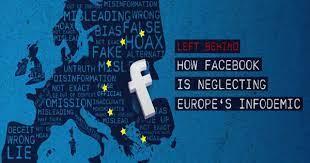
https://secure.avaaz.org/campaign/en/facebook_neglect_europe_infodemic/?... Executive Summary Facebook’s "America First" approach to fighting misinformation fails to protect European citizens A majority (56%) of fact-checked misinformation content in major non-English European languages 1 is not acted upon by Facebook, compared to only 26% of English-language content debunked by US-based fact checkers. This means Europeans are at greater risk of seeing and interacting with COVID-19-related misinformation Italian speakers are least protected from misinformation, with measures lacking for 69% of Italian content examined. 3 Next are French and Portuguese speakers, with measures lacking on 58% of French content 4 and 50% of Portuguese content. 5 Spanish speakers were most protected, though measures lacked for 33% of Spanish language content, 6 which is still more than English content Based on our sample analysis, on average, Facebook is almost one week slower to label non-English false content, taking 30 days for that content compared to 24 days for English-language false content. Facebook’s fight against the infodemic has failed to make an impact one year Despite a number of commendable steps to fight the ongoing infodemic, Facebook's action on fact-checked misinformation slightly decreased compared to last year 7 (55% in 2021 vs 56% in 20 The average delay between post publication and Facebook labelling was 28 days in 2 The platform fails to detect and label exact copies, "clones" or slightly altered, "variants" of false claims , i.e. minor changes to format or narrative on claims that have been debunked and already labelled on the platform. 51 such "clones" and "variants" reached an estimated 807,746 total interactions, and 63% of this content is missing warning labels by Facebook. 8 The top misinformation narratives we identified risk boosting vaccine hesitancy, and deter mask use The top misinformation narrative we identified (36 posts, 1.4M interactions) is about vaccine side effects, including death. One example is this false item about Bill Gates , who was claimed to have said during an interview that "[...] for every 10,000 people there would be permanent vaccination damage, including 700,000 expected deaths". 9 (29,050 interactions The second top COVID-19 misinformation narrative was around false official measures or warnings (16 posts, 536K interactions) See example here . The third top narrative was against masks, claiming they are either dangerous or useless. As an example, harmful misinformation claims that using masks leads to cancer and other diseases. We found 12 examples of this "clone" or "variant"- 92% unlabelled. See two examples here and here . Together, the 12 posts 10 have reached 118,288 interactions. EU must roll out strong regulation to inoculate against the infodemic Social media self-regulation has failed: one year into the ongoing pandemic, Facebook has not kept its promise to fully identify COVID-19- and vaccine- related misinformation in Europe The current EU Code of Practice on Disinformation does not cover the failures identified in this report. That is why we urgently need a revised version that pushes social media giants to disclose the amount of misinformation on their platforms and set clear goals for its reduction, monitored by an independent regulator. A new code will only be effective if it asks social media platforms to notify all users who have interacted with misinformation that they have done so and to reduce the algorithmic acceleration of misinformation content and actors. The analysis in this report is based on a sample of misinformation detected by our investigation team that was also fact checked by independent fact checkers. Facebook is not transparent and does not provide data, which would allow for amore detailed analysis on the full scale of misinformation on its platform. The EU Code of Practice must require more transparency from the platform to help researchers understand the full reach and harm caused by such content. Key Findings For this study we have analysed 135 pieces of misinformation content in five different languages (English, French, Italian, Spanish and Portuguese) that were posted in late 2020 or early 2021 and were rated false and misleading by reputable, independent fact checkers. In the graphs that follow we compare our analysis with the one we performed in 2020 , using exactly the same methodology used in the report we released in the pandemic's first months. For more information please refer to the Methodology and Data section.










Add new comment